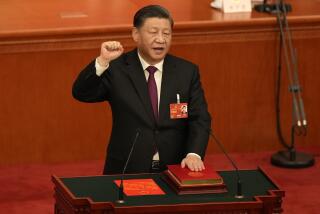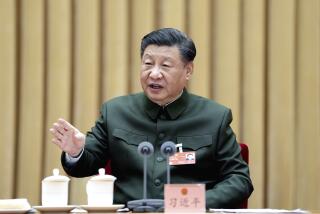Army Called China’s Best Defense : Communism: It is called the ‘pillar of the proletarian dictatorship.’ The party chief says it must play a greater role.
- Share via
BEIJING — China’s army must do more to defend the Communist Party’s dictatorship, while efforts should be boosted to eradicate the influence of Western-style liberal ideas within the military, Communist Party General Secretary Jiang Zemin said Monday.
“No matter what changes may happen in the international situation, it is of paramount importance for China to maintain stability,” Jiang told army delegates to the National People’s Congress in remarks paraphrased by the official New China News Agency.
The army is “a bastion of iron in defending the motherland and can and should play a still greater role in ensuring stability,” Jiang said, according to the agency’s paraphrasing. The army must “give better play to its role as the pillar of the proletarian dictatorship,” he added.
Jiang’s comments reflect the current leadership’s dependence on the military to preserve dominance for themselves and the Communist Party and their determination to solidify this power base.
“So long as China has the People’s Liberation Army as its powerful backup, attempts by these (Western) hostile forces are doomed to failure,” Jiang said, according to the official news agency, “and there is absolutely no way for the socialist system to be abolished on the Earth.”
Jiang, who heads China’s 48-million-member Communist Party, sharply attacked “bourgeois liberalization,” a phrase referring to the spread of Western ideas of democracy, civil liberties and capitalism. He warned against allowing the “peaceful evolution” of China into a democratic, capitalist society.
“He pointed out that the high sense of organization and discipline of the people’s army is the main cause for the fact that the army is combat-effective and can win over the enemy,” the agency reported. “Therefore, he called for more education in this respect and more effort to eliminate the influence of bourgeois liberalization on some people in the army and the resultant laxity.”
The People’s Liberation Army played a major political role in restoring order after the chaotic early years of the late Chairman Mao Tse-tung’s 1966-1976 Cultural Revolution.
But for more than a decade after Deng Xiaoping emerged as paramount leader in late 1978, stress was placed on building the army’s professionalism and cutting down its role in politics.
That trend was reversed when a hard-line group of mostly elderly leaders led by Deng, President Yang Shangkun and Premier Li Peng called in the army last June to violently suppress student-led pro-democracy demonstrations. Hundreds, perhaps thousands, of Beijing residents and students seeking to block the army’s path were killed when troops shot their way into the city the night of June 3-4.
Diplomats and other foreign observers in Beijing believe that many military officers are angry about the loss of the army’s prestige resulting from the use of force against the people of China’s capital city. But military leaders such as President Yang and his younger brother, Yang Baibing, who ranks fourth in the military hierarchy, have achieved increased political power.
Jiang, while lacking in military experience, heads the Communist Party’s Central Military Commission, a post that normally carries authority similar to that of commander in chief. President Yang, however, is believed to exercise greater real authority over the army.
More to Read
Sign up for Essential California
The most important California stories and recommendations in your inbox every morning.
You may occasionally receive promotional content from the Los Angeles Times.













